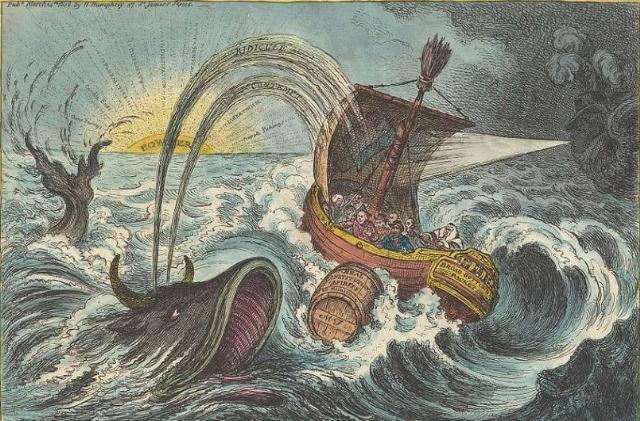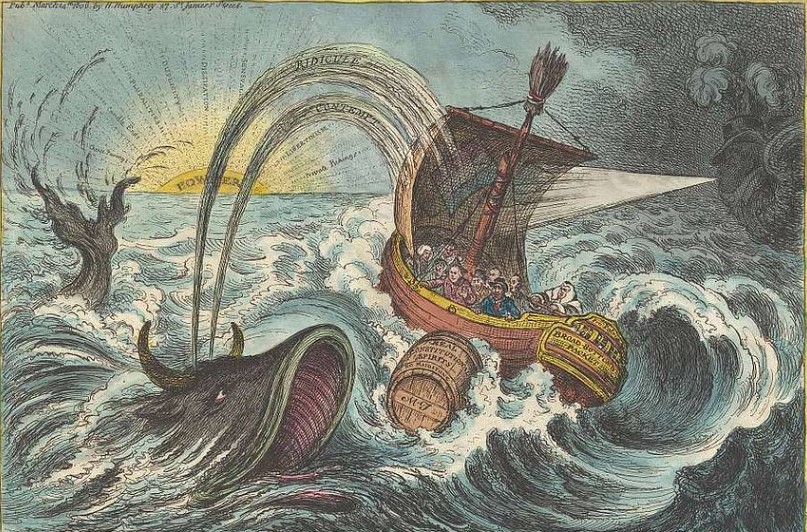

Photo Credit: Image via Picryl.
Picryl
Ned Ryun's new book is a blueprint for breaking the Deep State.Ned Ryun has written a new book, American Leviathan, and I was fortunate to get my hands on an advance copy.
If you don’t know Ned, he’s the founder of American Majority and Voter Gravity, grassroots organizations that specialize in fighting the culture war at the local level and electing America First conservatives. On cable news channels and in his writing, he’s an eloquent defender of the Constitution, limited government, and the American Republic as the Founding Fathers intended. I highly recommend that you read American Leviathan and share it with friends — especially friends who struggle to see clearly the stakes of the ideological war now raging.
How did we get to this point in time, when American leaders broadly repudiate the principles behind the Declaration of Independence and the U.S. Constitution, and an unaccountable, unconstitutional bureaucracy rules over the American people? How is it that both major political parties routinely ignore the will of voters and seem beholden to the administrative state? Why do prominent politicians — from Dick Cheney and Mitt Romney to Kamala Harris and Barack Obama — express an almost religious devotion to expansive government when our country was founded upon an inherent distrust of government power and a commitment to see such power forever chained? Why have the most prestigious news organs rejected free speech, embraced censorship, and become little more than propagandistic parrots for the State? It’s a long story, but it’s a story that must be understood in order for the American people to see with clear eyes what they’re actually fighting.
In American Leviathan, Ryun succeeds by making what is complicated quite comprehensible. He takes a century and a half of mostly forgotten history and political debate and boils down all the sordidness into a digestible, if unpleasant, meal. He traces the origin of the administrative state to a group of American intellectuals who were fascinated with Hegel’s philosophical defense of authoritarianism and the absolute power of the Prussian king. He pinpoints the rise of the Uniparty in the overlapping policy preferences of leading Republicans, Democrats, and socialists at the beginning of the twentieth century. He recounts how progressive Republicans, such as Robert La Follette and Teddy Roosevelt, advocated for radical expansion of government and rejection of long-respected constitutional constraints that mirrored many of the wishes of progressive Democrats, such as Woodrow Wilson and The New Republic founder Herbert Croly. Together, these various thought leaders (at times hostile to one another as they advanced similar goals) initiated what Ryun calls a “Progressive Statist movement” demanding a fundamental transformation of the American system of government and the elevation of the State at the expense of Americans’ individual liberties.
Ryun defines the administrative state, the national security state, and the Deep State as distinct entities reflecting varying degrees of power, privilege, secretiveness, and incompetence, but he recognizes all of these unelected factions as parts of the same beast: the Leviathan. With that appellation, he refers to the political treatise Leviathan, from seventeenth-century philosopher Thomas Hobbes, whose inclination toward a strong, centralized government emerged during the chaos of the English Civil Wars. In the Old Testament, Leviathan is a sea serpent and demon associated with the sin of envy. The monster eats the souls of those who are damned because they remain too attached to the material world to reach God’s realm and receive His grace. Although the biblical Leviathan epitomizes chaos, Hobbes used the idea of a terrifying creature composed of myriad souls as a metaphor for an all-powerful State constantly shaping citizens and feeding from their individual energies. The frontispiece to Hobbes’s Leviathan shows a monarch clutching the symbols of earthly power in one hand and spiritual power in the other. The monarch’s body is formed from hundreds of faceless individuals who, through their actions to support the king, embody the State. At the top of the illustration is a Latin quote describing Leviathan from the Book of Job: “There is no power on earth to be compared to him.” It is in this sense that Ryun describes the American Leviathan.
Although Hobbes saw the Leviathan as a necessary force for taming violent chaos, Ryun recognizes it for what it actually is: an uncontrollable, ever-growing, and ravenous beast that devours any prospect for representative democracy or individual liberty. Interestingly, just as Hobbes saw the Leviathan State as the union of the secular and spiritual worlds, Ryun sees the American Leviathan as a usurper claiming dominion over both worlds, too. He takes great pains to show how Progressive Statists depend upon a rejection of God, so that they can claim His powers as their own. In the same way that the theological Leviathan represents the deadly sin of envy, the American Leviathan is envious of all forms of power outside its own. Ultimately, to choose the unelected administrative state over the constitutional republic and the protection of Americans’ natural rights is to worship government above all else. The American Leviathan is an obscene and false god.
In his deftly written and often moving defense of the American Republic as founded, Ryun makes a compelling case for why Americans must slay the Leviathan that has co-opted their form of government and stolen so many of their individual liberties. He describes Woodrow Wilson’s disdain for popular sovereignty as the unofficial credo of this un-American and unelected “blob,” in which bureaucrats operate with scant oversight. He excoriates Progressive Statists’ naïve belief in the perfectibility of human nature and their dangerous faith in a ruling class entrusted with limitless power. He explains why the Leviathan’s attacks on natural rights can succeed only by rewriting both the Constitution and the story of America’s founding. He diagrams how the rise of an all-powerful bureaucracy is meant to replace private property and personal freedoms with concerns for “social justice” while turning the State into a quasi-divine entity capable of offering spiritual salvation. He proves that today’s “ruling elites” see representative democracy as “not just an inconvenience, but even more so an enemy and danger to the state.” He shows through countless examples that the vast bureaucracy is antithetical to the Constitution’s separation of powers. And he warns that those who have an “unshakeable faith” in the State’s “non-negotiable standards of right and wrong” will not hesitate to eliminate those Americans who oppose it.
America First Republicans, Ryun argues, must reject the legitimacy of the administrative state: “This is The Thing. Nothing else matters.” After a century of concentrated power “in the hands of a credentialed idiocracy who believe they are the final arbiters for government and society,” this is what we know: “The entire premise of the administrative state has been proven a farce.” He concludes that “it is time to declare political war” on the American Leviathan, “to tear it apart piece by piece, and to restore the Republic.” In a final chapter entitled “Slay Leviathan,” Ryun implores: “Break the State.” In that chapter, he describes exactly how President Trump should do so.
I have an expansive collection of writings from the earliest days of the American Republic. I hold them dear because they are a window into some of the greatest minds in human history. I will admit, though, that there is a wary voice in the back of my own mind whispering that there may come a day when the words of the Founders are more important as practical how-to guides than as intellectual heirlooms passed through history. In defending our country from those who wish to destroy it, Ned Ryun’s new book is one of those sources I want within reach. It’s a life-saving axe for those “in case of emergency, break glass” moments. And, I think Ned would agree, it’s time to break the glass.
<img alt="
Image via Picryl.
” captext=”Picryl” src=”https://conservativenewsbriefing.com/wp-content/uploads/2024/09/slaying-leviathan.jpg”>
Image via Picryl.





